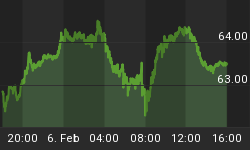Below is an extract from a commentary originally posted at www.speculative-investor.com on 28th May 2006.
Tech Stock Valuations
The valuations of the major tech stocks reached astronomical heights during the late 1990s, but with a few notable exceptions -- Google, for one -- their current valuations aren't particularly high. They generally aren't cheap, but current tech stock valuations don't give strong support to the bearish case.
Intel (NASDAQ: INTC), for example, is currently priced at around 14-times 12-month trailing earnings and 2.6-times sales, which is quite reasonable for a company that happens to be the world's leading manufacturer of semiconductors and that generates a return on equity of around 22%. Furthermore, INTC's current valuation makes it look like a screaming bargain compared to most of the major gold stocks.
The main problem faced by investors in INTC and many other large-cap tech stocks isn't the current valuation, but the fact that tech stock valuations are immersed in a secular decline. Price/earnings ratios, price/sales ratios, price/book ratios, etc., are in long-term downward trends, which means that the stocks will probably do worse than the underlying businesses for many years to come. For example, if Intel were to increase its earnings by 100% over the next 7 years then its stock price would probably rise by less than 100% over this period. Putting it another way, investors in tech stocks are rowing against a powerful valuation tide.
The following chart shows that the Intel stock price has spent the past 5 years in a range bounded by $15 and $35. Its stock price has essentially spent the past 5 years going nowhere in a fairly interesting way. However, over this period Intel's valuation has plunged. In all likelihood it will complete the remainder of its bear market without moving below the bottom of this range, but it's valuation will probably remain in a long-term downward trend such that at some future point -- around the time that its next secular bull market is about to begin -- it trades at a single-digit P/E.

The US stock market's real performance
Almost all of the gains achieved by the S&P500 Index over the past three years are inflation-induced. We know that this is the case because of the huge divergence between the nominal S&P500 Index and the S&P500/gold ratio (the REAL S&P500) that has developed since mid 2003. With reference to the following chart, notice that the nominal S&P500 and the real S&P500 tracked each other very closely during the five years leading up to mid 2003, but from this point forward they've taken very different paths. In fact, whereas the nominal S&P500 index is presently about 60% above its Q1 2003 bottom the real S&P500 recently hit a new bear market low.

The above chart highlights a danger of being aggressively 'short' the market. Even when a market is falling in REAL terms, someone who bets against the market can still lose a lot of money.
The stock market crash of 2006
During the three-year period prior to the start of this year the Middle Eastern stock markets performed extremely well, to say the least. And this incredibly good performance, which was fueled by a flood of 'petro-dollars' and rampant speculation, continued during the first few weeks of this year. However, although the oil price has remained near its all-time high these markets have, over the past three months, collapsed in the way that all speculative manias eventually collapse. For example, at its recent low the Saudi Arabian stock market, a weekly chart of which is included below, was down by 50% from its February-2006 peak, while the stock markets of Dubai, Turkey and Egypt were down by 62%, 34% and 27%, respectively, from the highs reached earlier this year.

Chart courtesy of http://www.fullermoney.com/
As far as the senior stock markets of the world are concerned, the crashes that have already occurred in some of the peripheral markets are warning shots. We don't think there's a realistic chance of the S&P500 Index or the Dow Industrials Index falling by anywhere near 50% from their recent highs, but all the markets that have been pushed upward by the rising sea of liquidity over the past two years are vulnerable to some extent now that the tide has begun to go out. The markets that have been the recipients of the greatest amount of speculation -- the stock markets of the Middle East, South America and India, for instance -- will likely be hit the hardest, but all markets will probably be hit.















